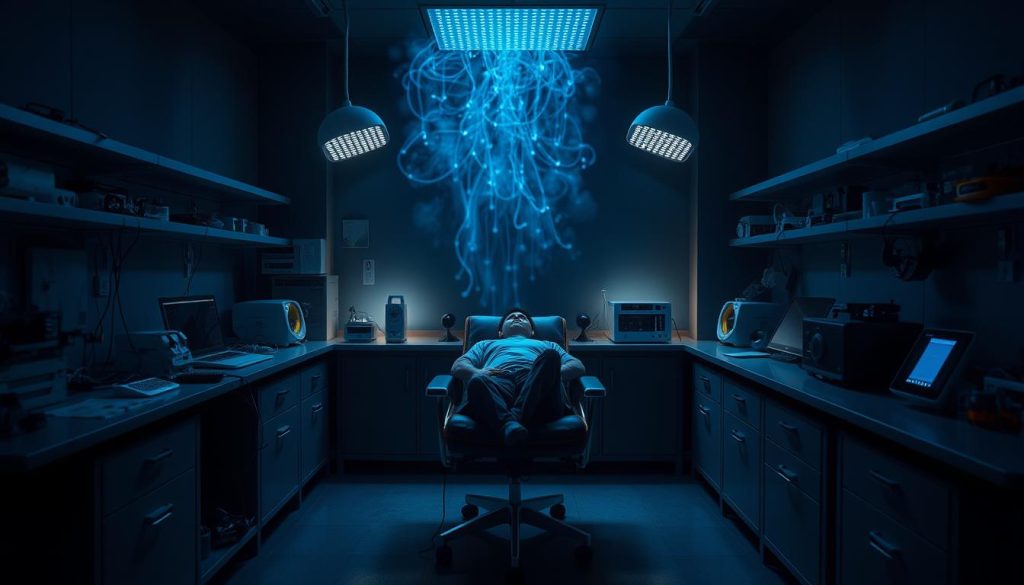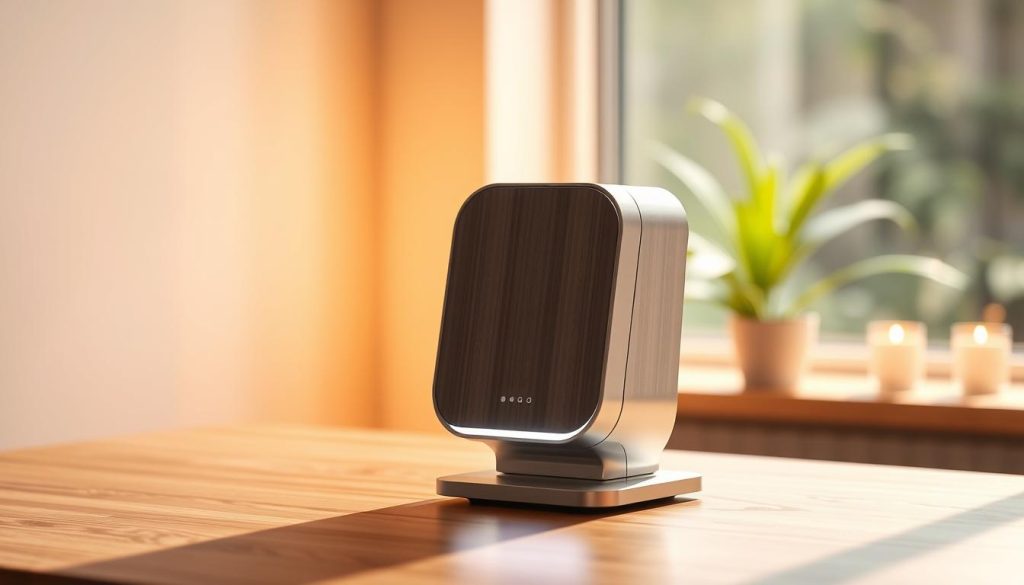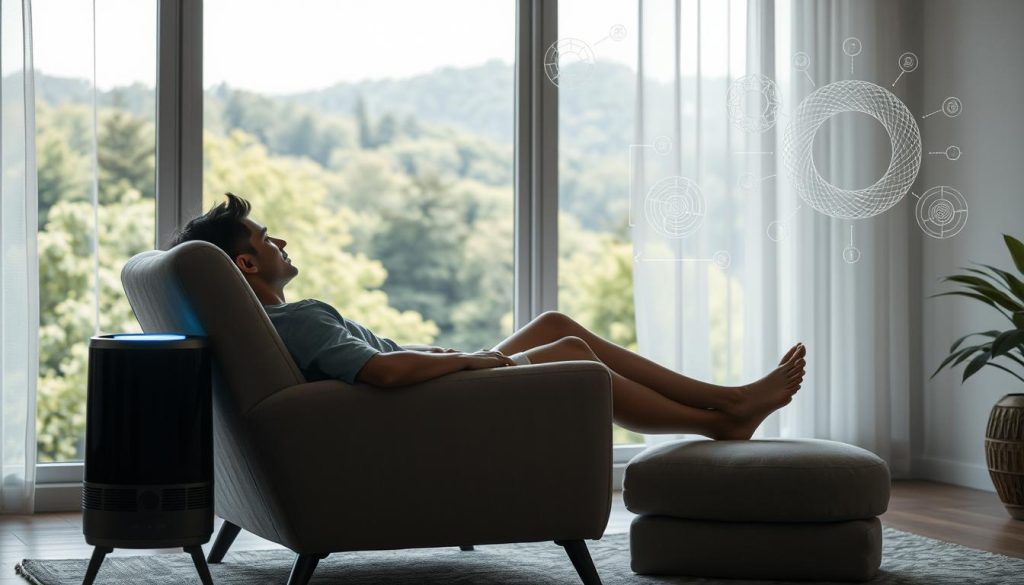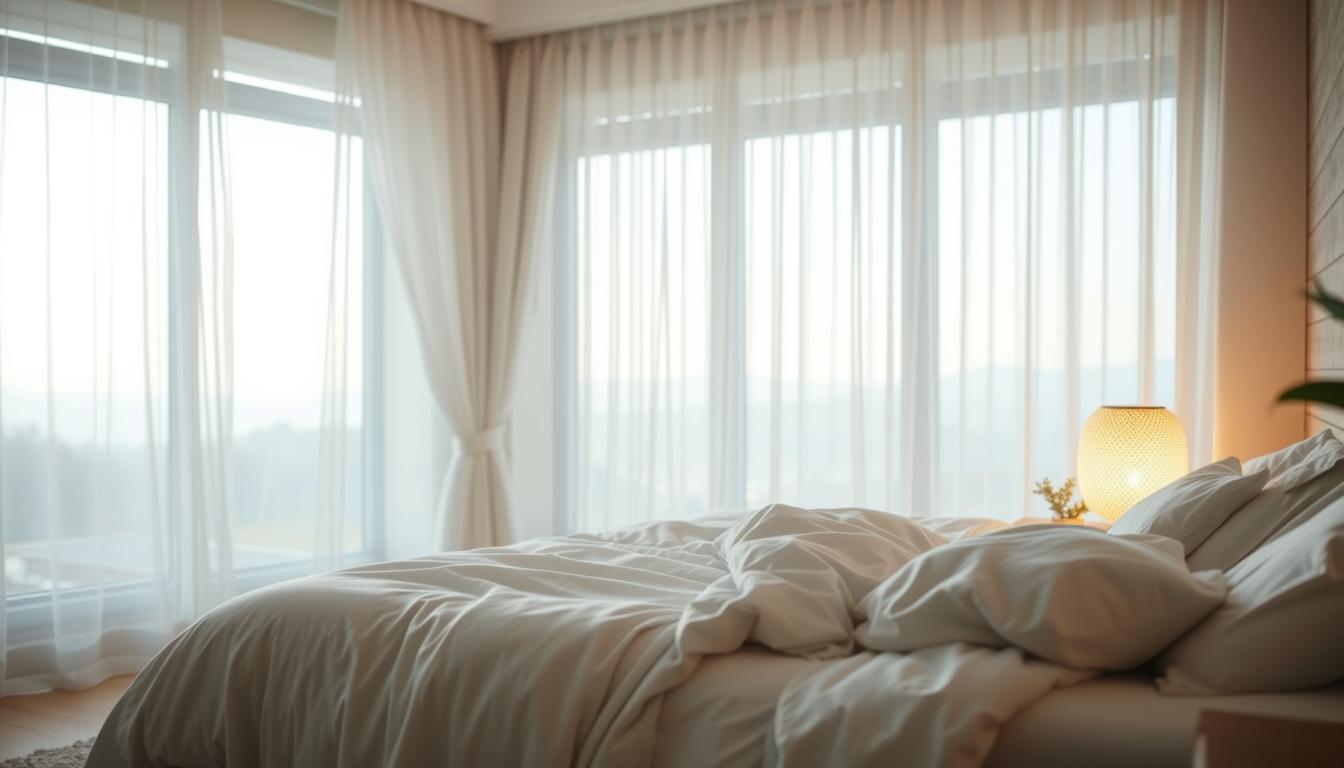Are you tired of tossing and turning at night? Discover how negative ions for better sleep can transform your nightly rest. These tiny particles, found in nature, promise a healthier lifestyle and increased energy levels.
From serene waterfalls to freshly forested areas, negative ions are all around us. They boost our wellbeing and prepare us for a refreshing sleep.
Embracing the power of negative ions could be your key to better sleep. It can improve your overall quality of life. Let’s explore the science and benefits of these fascinating particles.
Understanding Negative Ions
Negative ions have more electrons than protons, making them negatively charged. They are found naturally and help keep the environment balanced. Knowing where they come from helps us see how they affect our health.
What are Negative Ions?
Negative ions form when air molecules pick up extra electrons. This can happen due to sunlight, radiation, or water movement. They can make us feel better, reduce stress, and help us sleep well.
Where Do Negative Ions Come From?
Negative ions are found in waterfalls, mountains, and forests. Thunderstorms also create a lot of them. These places help keep the air full of negative ions, making it healthier.
Beaches and green spaces show how negative ions affect our bodies and minds. They are key to a good night’s sleep. Learning about negative ions helps us value their role in creating a peaceful sleep space.
The Science Behind Negative Ions and Sleep
Sleep is key for our health, and studies show negative ions can help. They make us feel calmer, leading to better sleep. This is backed by science.
Research on Negative Ions
Research shows negative ions, found in nature, can change our sleep and health. They boost oxygen to the brain, helping us focus and feel less sad. This supports using negative ions to improve health, including sleep.

How Negative Ions Affect the Brain
Negative ions make our brain work better and feel calm. They increase serotonin, which controls mood and anxiety. This helps us sleep better and feel happier. These discoveries help us use our environment to get better sleep and health.
Negative Ions for Better Sleep
Negative ions are known as nature’s stress relievers. They have been linked to better sleep quality. This section explores how negative ions help improve sleep and presents scientific studies that support these benefits.
Mechanisms of Action
Negative ions boost serotonin production in the brain. Serotonin helps control mood, social behavior, and sleep. Studies show that negative ions increase serotonin levels, leading to better sleep.
They also improve blood flow and oxygenation, calming the body. Negative ions can neutralize harmful free radicals. This reduces oxidative stress and helps create a sleep-friendly environment.
Scientific Studies
Research shows that negative ions can improve sleep. A study in the Journal of Medicinal Chemistry found positive effects on sleep. People exposed to more negative ions fell asleep faster and slept more deeply.
A study in the International Journal of Biometeorology found that negative ions reduce insomnia symptoms. They also improve sleep efficiency. The researchers suggest that negative ions could be a non-invasive treatment for sleep issues.
Here’s a comparison of sleep quality from studies on negative ions:
| Study | Participants | Key Findings |
|---|---|---|
| Journal of Medicinal Chemistry | 150 | Improved sleep onset and depth |
| International Journal of Biometeorology | 200 | Reduced insomnia symptoms, better sleep efficiency |
Negative Ion Therapy Explained
Negative ion therapy is becoming more popular as an alternative to traditional sleep aids. It uses negative ions to improve well-being. This holistic method is gaining attention.
Types of Negative Ion Therapy
There are many ways to use negative ion therapy. Wearable devices like necklaces or bracelets release negative ions all day. Stationary devices, like air purifiers, also create a negative ion-rich environment. Portable devices let you take negative ions with you wherever you go.
Each type has its own benefits. It’s important to pick the one that fits your needs and lifestyle.
How Effective is Negative Ion Therapy?
Research shows that negative ions can help with sleep and well-being. They might reduce stress and anxiety, which can disrupt sleep. But, more studies are needed to confirm this.
Negative ion therapy is an interesting option for those looking for alternative sleep solutions. As more research comes in, we’ll learn more about its effectiveness.
Benefits of Negative Ions for a Restful Sleep
There’s a growing interest in how negative ions help with insomnia. Many stories and studies show their positive effects on sleep. Negative ions are a natural way to fight sleep disorders and boost overall health.
Improved Sleep Quality
Negative ions are great for better sleep. They boost serotonin, the “happy hormone.” This helps regulate mood, making it easier to sleep.
Studies show that places with more negative ions lead to better sleep. People sleep more soundly and wake up feeling refreshed.
Reduction in Insomnia Symptoms
Negative ions are also good for insomnia. They help those who have trouble sleeping or wake up often. They create a calm atmosphere, reducing stress hormones.
Using negative ions for better sleep is a natural choice. They help you sleep better and wake up feeling great.
How to Incorporate Negative Ions into Your Sleep Routine
Adding negative ions to your bedtime routine can really boost your sleep. Here are some easy ways to add these ions to your space. You can use technology or natural methods.
Using Negative Ion Generators
One great way to get negative ions in your bedroom is with a negative ion generator. These gadgets release ions that make the air cleaner, cut down on allergens, and help you sleep better. When picking one, find one that lets you adjust the ion flow to fit your needs.

Natural Methods to Increase Negative Ions
For a more natural way, you can boost negative ions in your home without gadgets:
- Indoor Plants: Some plants, like spider plants and ferns, clean the air and add negative ions. They make your bedroom a better place to sleep.
- Salt Lamps: Himalayan salt lamps are pretty and also release negative ions. They help make the air better.
- Water Features: Indoor fountains and aquariums increase negative ions. They do this by moving water, which naturally makes negative ions.
- Aromatherapy: Using essential oils like lavender and eucalyptus can help with sleep. They work well with negative ions to make you sleep better.
Mixing tech and natural methods can make a sleep-friendly environment. This can improve your sleep and overall health.
Negative Ions and Your Circadian Rhythm
Negative ions and circadian rhythm have caught a lot of attention lately. Our body’s internal clock, or the *circadian rhythm*, is key to our sleep-wake cycle. Negative ions might affect this clock.
Studies show that negative ions can help our biological clock. They boost serotonin and lower stress hormones. This can make our sleep cycle more stable, boosting our overall health.
Let’s explore how negative ions work with our circadian rhythm. They improve air quality, which helps us sleep better. Clean air without pollutants means deeper, more refreshing sleep. Here’s how negative ions affect our circadian rhythm.
| Factor | Impact of Negative Ions |
|---|---|
| Serotonin Levels | Boosts serotonin, aiding mood and stress regulation |
| Stress Hormones | Reduces cortisol, minimizing disruptions in the sleep-wake cycle |
| Air Quality | Purifies air, facilitating deeper, more restful sleep |
In summary, adding negative ions to your space can positively affect your circadian rhythm. This can lead to better biological clock regulation and a healthier sleep cycle. It improves sleep quality and overall health.
Are There Any Risks Associated with Negative Ions?
Many people are curious about the safety of negative ions. Both fans and doubters have their say. It’s important to know the truth about negative ion safety to make smart choices.
What Research Says About Safety
Studies show that negative ions are safe for us. They don’t cause harm, thanks to their natural presence. These ions improve air quality and our mood, just like being near waterfalls or after a storm.

Common Myths and Facts
Let’s clear up some myths about negative ions:
| Myth | Fact |
|---|---|
| Negative ions are harmful and toxic. | Negative ions are naturally occurring and safe, enhancing air quality and mood. |
| Exposure to negative ions can cause illness. | No credible studies show any harmful effects from negative ions; they are, in fact, found in clean, natural environments. |
| Negative ion generators are the same as ozone generators. | Negative ion generators produce ions that bond with particles in the air, while ozone generators produce ozone, which can be harmful in high concentrations. |
Real Life Stories: How Negative Ions Helped with Sleep
Many people have found better sleep thanks to negative ions. Their stories show how these ions can improve sleep quality. Here are some powerful
Testimonial 1
Megan used to have trouble sleeping. But after getting a negative ion generator, her nights became peaceful. A friend had recommended it, and it worked wonders.
She noticed she woke up less often. Megan believes negative ions helped her sleep better, just like many others.
Testimonial 2
Daniel worked long hours under artificial lights. He added a Himalayan salt lamp to his bedroom. This change brought him calm and helped him fall asleep faster.
His story shows how negative ions can change sleep patterns for the better.
Megan and Daniel’s stories show how negative ions can lead to better sleep. Their experiences are inspiring and show the wide benefits of these ions.
Future of Negative Ion Technology for Better Sleep
Negative ion technology is changing how we think about sleep health. Ongoing research and new ideas are bringing us closer to better sleep. Scientists are studying how negative ions affect our health and how they can improve sleep.
New sleep solutions are being developed with negative ion technology. This includes next-generation devices and sleep products that release negative ions. Companies and researchers are working hard to make these products a part of our daily lives. They aim to help everyone get better sleep through innovation.
The future of sleep looks exciting, with personalized sleep environments on the way. Imagine a bedroom that adjusts negative ions based on your sleep needs and environment. This could make getting good sleep easier for everyone. With these advancements, the future of sleep solutions is looking very promising.

